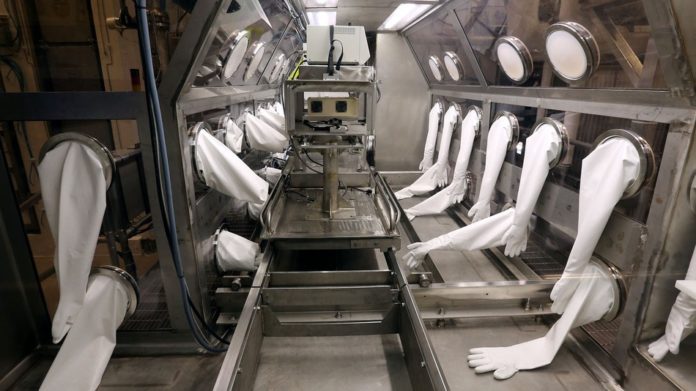Department of Defense accidentally sent anthrax to more than 50 labs

The Pentagon is scrambling Thursday to find out how kits containing live spores of anthrax were accidentally sent to more than 50 labs in 18 states, as well as Washington, D.C., and Australia, South Korea and Canada over a period of at least 10 years.
The CDC says there’s no risk to the general public; spores in these types of kits wouldn’t pose a threat unless they’ve been weaponized and aerosolized. Some 31 people, none of whom have displayed symptoms, are being treated with antibiotics as a preventative measure.
Warren at Pentagon: “As of now, all our investigations … has lead us to the fact there is no risk to the public at this point.”
— Julian E. Barnes (@julianbarnes) June 2, 2015
While officials plan to examine 400 batches, expectations are that the number of labs that received the kits will rise as only four batches have been fully tested all tested positive for live spores. Navy Cmdr. Franca Jones, director of Pentagon medical programs for chemical and biological defense, said on Wednesday: “We’ll find more.”
Indeed, the number of states containing labs believed to have received possibly live spores has doubled since the original announcement.
Deputy Defense Secretary Bob Work told reporters on Wednesday: “We’ve been following these protocols for 10 years, and this is the first time this has been brought to our attention.”
Kits are sent to both military and commercial labs for research purposes — but they are required to be irradiated, killing any live spores that may have been in the samples. Tests are supposed to confirm the death of the spores. In this case, the tests either failed or were never performed at all.
The Pentagon was first alerted to the issue on May 22 by a commercial lab in Maryland that had discovered live anthrax spores in a kit it had received from the Department of Defense. But the oldest catch so far confirmed to have contained live spores, according to NBC News, dates back to 2005. That means there are at least ten years worth of kits to investigate for potentially live spores. The Pentagon itself received samples that still contained live spores, originating from a batch at the U.S. Army’s Dugway Proving Ground in Utah.
While the specific labs haven’t been identified, the Department of Defense’s website on the case lists the 18 states thus far as California, Delaware, Maryland, Massachusetts, New Jersey, New York, Rhode Island, Tennessee, Texas, Utah, Virginia, Washington, Wisconsin, Arizona, Florida, Illinois, Ohio, and North Carolina.
The Associated Press contributed to this report.
